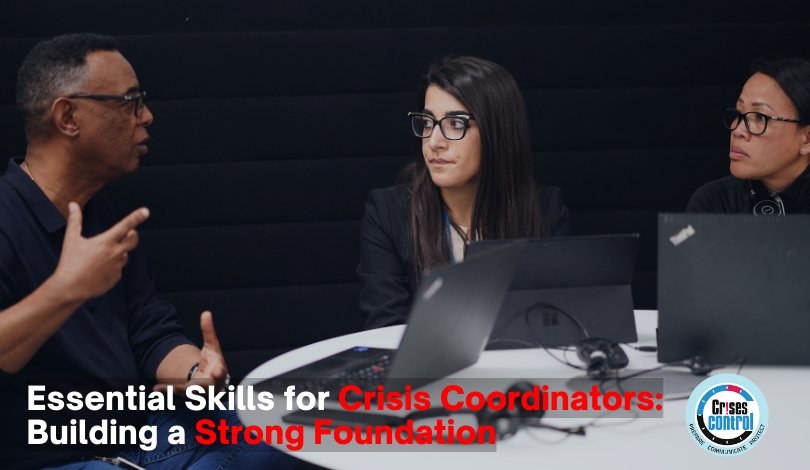In the face of a crisis, organisations and stakeholders turn to their crisis coordinators, seeking a guiding hand to navigate the storm, engage in crisis management and emerge unscathed. The weight of this responsibility is immense, and for a crisis coordinator to rise to the occasion, meticulous planning, preparation, and the right mindset are indispensable. In this blog, we unravel the key elements that empower crisis coordinators to shoulder this critical role with unwavering confidence. From honing essential skills to embracing the latest tools and cultivating the right attitude, we chart the course for building a robust foundation in crisis management. Let’s delve into the realm of crisis coordination and equip ourselves to tackle adversities with finesse and poise.
Understanding Crisis Management
Crisis management is the process of identifying, preparing for, and responding to potential crises and emergencies that may arise within an organisation. It involves a set of strategies and actions aimed at minimising the negative impact of crises and facilitating a swift return to normalcy.
The Importance of Emergency Management for Organisations
Effective emergency management is crucial for organisations to protect their reputation, maintain stakeholder trust, and ensure business continuity. It enables companies to respond promptly and efficiently to crises, reducing potential damages and liabilities.
Key Responsibilities of a Crisis Coordinator
Crisis coordinators play a pivotal role in crisis management. They are responsible for overseeing crisis response plans and coordinating efforts to handle emergencies effectively.
Identifying Potential Crisis Situations
Crisis coordinators must proactively identify potential crisis situations by monitoring internal and external factors that could lead to emergencies.
Developing Crisis Response Plans
Creating comprehensive crisis response plans is vital. These plans outline the steps and protocols to be followed when a crisis occurs, ensuring a structured and organised response.
Coordinating Communication Channels
Effective communication is crucial during a crisis. Crisis coordinators must establish clear communication channels to disseminate information to all relevant parties promptly.
Ensuring Timely Response and Action
In a crisis, time is of the essence. Crisis coordinators must ensure that the response is swift and actions are taken promptly to mitigate the impact of the crisis.
Essential Skills for Crisis Coordinators
To be effective in their roles, crisis coordinators must possess a specific set of skills that enable them to handle high-pressure situations with confidence.
Communication Skills
Excellent communication skills are essential for crisis coordinators to convey information clearly and concisely, both internally and externally.
Problem-Solving Skills
Quick and effective problem-solving abilities are crucial for crisis coordinators to make sound decisions under pressure.
Decision-Making Skills
The ability to make well-informed decisions swiftly is vital during a crisis. Crisis coordinators must weigh options and choose the most appropriate course of action.
Leadership Skills
Crisis coordinators must demonstrate strong leadership qualities to guide their teams through challenging times and keep morale high.
Adaptability and Resilience
Crisis situations can be highly dynamic. Crisis coordinators must be adaptable and resilient, ready to adjust their plans as the situation unfolds.
Crisis Software and Its Role in Crisis Management
In the digital age, crisis software has emerged as a valuable tool for organisations to enhance their crisis response efforts.
Advantages of Using Crisis Management Software
Crisis software provides real-time monitoring, automated alerts, and centralised data management, streamlining the crisis management process.
Features to Look for in a Crisis Software
When selecting incident management software, it’s essential to consider features such as incident tracking, communication tools, and analytics capabilities.
Incident Management Best Practices
An integral part of emergency management is effective incident management. Implementing best practices can significantly impact crisis resolution.
Incident Identification and Classification
Properly identifying and classifying incidents helps crisis coordinators prioritise their responses based on severity.
Incident Recording and Reporting
Accurate and detailed incident recording and reporting enable organisations to conduct thorough post-incident analyses.
Incident Analysis and Resolution
Analysing incidents provides valuable insights for improving crisis response plans and preventing future crises.
Building a Strong Foundation for Crisis Coordinators
To build a robust management framework, organisations must invest in their crisis coordinators’ development.
Training and Education
Continuous training and education help crisis coordinators stay updated on the latest crisis management strategies and best practices.
Mock Crisis Drills and Exercises
Conducting mock crisis drills and exercises allows crisis coordinators to practise their skills in a simulated crisis scenario.
Collaboration and Team Building
Fostering a culture of collaboration and team building enhances the efficiency and effectiveness of crisis response efforts.
Conclusion
In conclusion, crisis coordinators play a critical role in safeguarding organisations from the adverse effects of crises. By honing essential skills, leveraging crisis management software, and adopting best practices in incident management, these coordinators can build a strong foundation for crisis management within their organisations.
For a live demo of how Crises Control can assist your organisation in crisis management, request a live demo today or get in touch with our experts.








